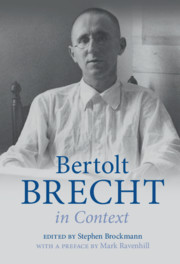Book contents
- Bertolt Brecht in Context
- Bertolt Brecht in Context
- Copyright page
- Contents
- Figure
- Notes on Contributors
- Chronology
- Abbreviations
- Preface
- A Note on Brecht in English
- Introduction
- Part I Brecht’s World
- Chapter 1 Brecht’s Augsburg Years
- Chapter 2 Models for Epic Theater from the Munich Years:
- Chapter 3 Brecht in the Weimar Republic
- Chapter 4 Brecht’s Emergence as a Young Poet
- Chapter 5 Brecht and Music: The Fly in the Amber
- Chapter 6 Brecht and Political Theater
- Chapter 7 Brecht and Germany
- Chapter 8 “[She] made suggestions. We took them”: Bertolt Brecht’s Women Collaborators
- Chapter 9 Brecht’s Interviews
- Chapter 10 Brecht and Exile
- Chapter 11 Brecht and the German Democratic Republic
- Chapter 12 The Berliner Ensemble
- Part II Brecht’s Work
- Part III The World’s Brecht
- Concise Bibliography
- Index
Chapter 4 - Brecht’s Emergence as a Young Poet
from Part I - Brecht’s World
Published online by Cambridge University Press: 28 May 2021
- Bertolt Brecht in Context
- Bertolt Brecht in Context
- Copyright page
- Contents
- Figure
- Notes on Contributors
- Chronology
- Abbreviations
- Preface
- A Note on Brecht in English
- Introduction
- Part I Brecht’s World
- Chapter 1 Brecht’s Augsburg Years
- Chapter 2 Models for Epic Theater from the Munich Years:
- Chapter 3 Brecht in the Weimar Republic
- Chapter 4 Brecht’s Emergence as a Young Poet
- Chapter 5 Brecht and Music: The Fly in the Amber
- Chapter 6 Brecht and Political Theater
- Chapter 7 Brecht and Germany
- Chapter 8 “[She] made suggestions. We took them”: Bertolt Brecht’s Women Collaborators
- Chapter 9 Brecht’s Interviews
- Chapter 10 Brecht and Exile
- Chapter 11 Brecht and the German Democratic Republic
- Chapter 12 The Berliner Ensemble
- Part II Brecht’s Work
- Part III The World’s Brecht
- Concise Bibliography
- Index
Summary
This essay outlines the semantic breadth and formal contours of Brecht’s early poetic experiments. For his Hauspostille (Domestic Breviary) collection (1927) Brecht pulled together those poems that he wrote between 1913 and 1925 as sharp protest against social tensions and frictions in the Weimar period. The title of his collection refers to Martin Luther’s “Postille” writings and their ritualized religious instructions. Brecht secularizes Luther’s religious agenda and poetic agitation when he categorizes his poems as Gebrauchslyrik (functional or everyday poetry). Their cynicism not only activates the reevaluation of classical literature and aesthetics, but more poignantly also the social norms, gender concepts, moral judgments and legal processes of bourgeois society. The essay argues that Brecht’s early poetic experiments model a cynical mindset that not only informs his anti-fascist satires in exile but also his later work as it set a standard for the twentieth-century modes of poetic and theatrical reflection in general.
Keywords
- Type
- Chapter
- Information
- Bertolt Brecht in Context , pp. 41 - 48Publisher: Cambridge University PressPrint publication year: 2021

